Slab Leak Detection & Repair
In the theme park of plumbing disasters, a slab leak is T-rex. The apex predator.
It potentially causes the most damage and yet is the most difficult to detect. You may not even know it exists until you wake up to a flooded living room.
Early intervention is critical. Smart monitors can shut down slab leaks before they do their worst. Plumbers have special equipment to detect slab leaks and can repair them using minimally invasive techniques (in most cases).
If you live in a home with older pipes, or your house stands on unstable soil, you might want to have us take a look.
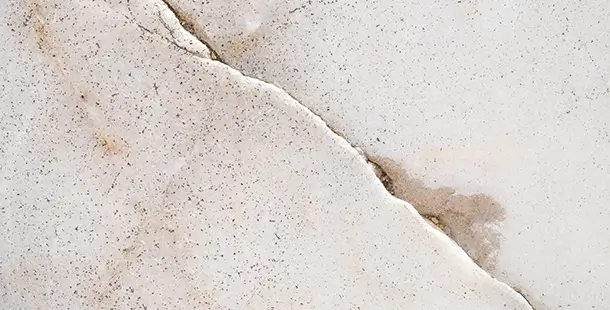
What Is a Slab Leak & What Causes It?
A slab leak occurs in the pipes in the foundation of a building — the concrete “slab.”
Most slab leaks start as pinhole leaks in a corroded pipe but can erupt with little warning into a flood, causing significant damage. Or they can seep for weeks into baseboards and walls, creating a perfect breeding ground for mold.
Older homes with ancient plumbing are especially vulnerable. Most metal plumbing lasts 40-80 years, but corrosive elements in water and the environment can accelerate pipe deterioration. Shifting soil and changing pressure can damage once secure pipes in the foundation.
The most common predictors of a slab leak are:
- Advanced pipe age
- Pipe corrosion
- Unstable, shifting soil (clay soil, earthquakes, heavy equipment vibrations, etc.)
- High water pressure in pipes
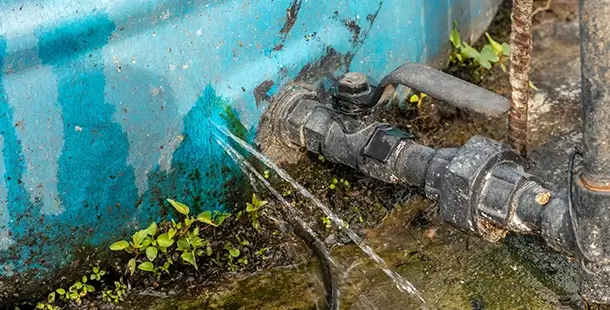
What Are the Telltale Signs of a Slab Leak?
You may have a slab leak if you notice any of these things.
- Cracks in the floor or walls
- Heightened humidity levels
- Unexplained spikes on your water bill
- Wet spots on floors
- Warped flooring or constantly damp carpet
- Musty smells
- Hot spots on floors
During quiet times you may hear an odd humming coming from beneath your home — this could be a symptom of trouble bubbling up under the foundation.
Call us immediately if you suspect a slab leak. The problem never goes away on its own.
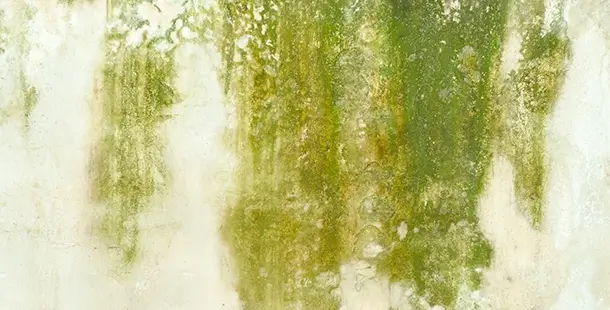
How Do We Detect a Slab Leak?
The certified professionals at Orange Coast Plumbing have diagnostic equipment to detect even the tiniest pinhole leaks.
- Acoustic leak detectors that listen for bubbling and humming sounds
- Infrared cameras that detect temperature changes in walls and floors
- Pressure sensors to detect pressure variations in pipes
- Moisture readers to find damp areas
These tools can find any leak or damage that may cause future problems.
How Do We Repair a Slab Leak?
In most cases, we can repair a slab leak without tearing up your floors and walls — especially if we catch the leak early.
- We may cut out a damaged section of pipe, replace it with flexible PEX tubing, and then fill the hole with cement or epoxy. This process takes just a few hours.
- We may replace the line with trenchless methods, creating an access port through the foundation to thread a new pipe under the slab without digging.
- We may use cured-in-place relining, inserting a sleeve of epoxy resin into the damaged pipe. The epoxy hardens into new piping and seals any holes.
However, if the slab leak has caused extensive damage to your foundation and walls, you face an invasive repair that could last weeks and involve an entire team of specialists, not just plumbers.
Again, call us immediately if you suspect a slab leak in your home!
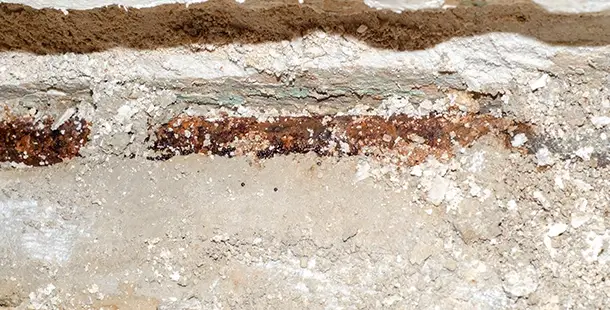
How Much Does Slab Leak Repair Cost?
It depends. And it can vary from several hundred dollars to tens of thousands of dollars.
It depends on the location of the slab leak, the extent of the leak, and the damage the leak has done.
Some repairs are relatively easy — little more than replacing a section of damaged pipe. If you catch the leak early enough, repair involves a plumbing call.
But most slab leak repairs are almost like construction projects with plumbers, building contractors, and mold specialists in the mix. The restoration process can go on for weeks.
As for the plumbing portion, we may have to replace an entire line of pipe, or, if your plumbing is badly corroded, reline or replace most of the plumbing in your home.
Again, it pays to have us inspect your plumbing if you think you could be at risk for a slab leak. It’s much cheaper to prevent than to repair.
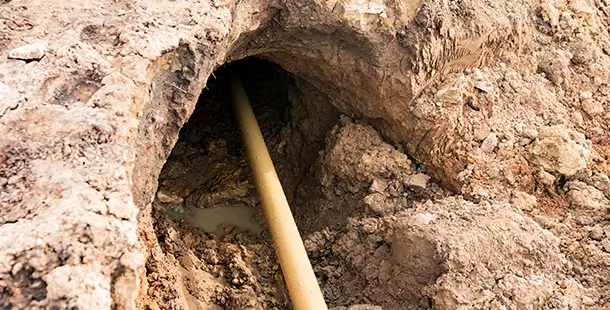
How to Prevent a Slab Leak from Happening
Your best protection against slab leaks, bar none, is to install an inline water leak detector like the Moen Flo Smart Water Monitor and Shut Off.
This smart device monitors the temperature and pressure of water in your plumbing. It takes 7-10 days to learn your behavior and use patterns, after which it can detect even the smallest leaks. The shut-off feature kicks in automatically when it senses a leak, preventing catastrophic damage.
And yes, to answer your question, we sell and sell and install these nifty smart gadgets at Orange Coast Plumbing.
But you should also schedule regular inspections by a professional plumber who can test your lines.
A smart monitor will shut down your water supply if it detects a problem. A plumber can prevent the problem from developing in the first place.
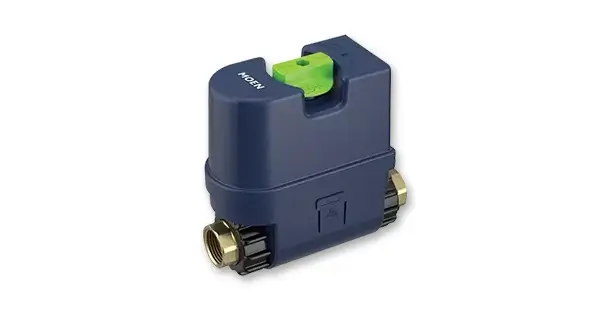
Frequently Asked Questions about Slab Leaks
What is a slab leak?
Asked by James in Irvine, CA
A slab leak is a water pipe leak within a slab foundation. Many Southern California homes are built on a concrete slab or pad, unlike homes in the Midwest with their crawl spaces and basements.
In slab foundation construction, pipes are laid within the concrete slab; when a water pipe leak occurs, it’s called a “slab leak.”
What causes a slab leak?
Asked by Melanie in Garden Grove, CA
Old age and corrosion in old pipes are the leading cause of slab leaks. Old copper and galvanized steel pipes corrode; poor water quality, like the hard water of Orange County, can damage pipes.
Sometimes the concrete slab shifts, which puts pressure on pipes and breaks them. Houses built on clay soils are vulnerable, as the clay expands and contracts with moisture.
Earthquakes and vibrations from heavy equipment and passing trains will weaken concrete slab foundations.
We had rain for a few days; then we noticed the floor dampened. We've never had drainage problems before. Could it be a slab leak?
Asked by Josh in Mission Viejo
Slab leaks often leave damp floors or even puddles. So, if you’re reasonably sure you don’t have a drainage issue, you may have a slab leak on your hands.
It could be that the rain moistened things enough to make a smaller leak visible. Check your water bill — an unexplained increase may confirm a slab leak. If you have any doubts, it’s much cheaper to have the Orange Coast Plumbing team inspect for pinhole leaks than to clean up after a slab leak disaster.
Our water bill was high this month, but we haven't noticed any wet spots. Could we have a slab leak?
Asked by Samantha in Huntington Beach
As long as your water usage habits haven’t changed, yes, it’s possible. Sometimes it takes a while for the water to accumulate and be noticeable.
Hot water slab leaks will warm areas of your floor to the touch. If you have older pipes, or if your house is built on clay, call in a professional to check your pipes. An inspection may cost a few hundred dollars. A repair can run into thousands of dollars.
How can I spot a slab leak?
Some of the most common signs of a slab leak include:
- Water or puddles on the floor;
- Damp carpet, flooring, or walls;
- Drywall close to the ground or wood floors buckling and warping;
- The sound of water running when all taps and faucets are turned off;
- Warm spots on the floor (this could be from a hot water slab leak).
Another clue can be damp spots around your foundation. Sometimes the water finds its way outside and creates wet areas on the ground instead of coming up through your floor.
One of the best indicators is an increase in your water bill, unexplained by any changes in water usage.
If you notice one or more of these signs, call a professional who can pinpoint a small leak before a pipe breaks.
How do plumbers locate slab leaks? I don't want to have my whole floor pulled up!
We understand; the thought of having your whole floor pulled up is unpleasant!
We try to be as minimally invasive as with slab leak repairs.
First, we use special technology to pinpoint the leak. This includes listening devices, thermal imaging cameras, air tanks, and moisture readers.
Hot water leaks are the easiest to detect with thermal imaging cameras. For cold leaks, we use water pressure gauges to check each of the lines to see which of them has lower pressure, indicating a leak. Then, we use a special listening device to hone in on the leak’s location.
Sometimes it’s tough to locate leaks under a shower or bath, but a skilled professional with the right tools and technology can pinpoint any slab leak.
How are slab leaks repaired?
Asked by Ben in Seal Beach
Once we locate a leak, we can either re-route your line or do a direct repair.
In a direct repair, we dig up a small area in your floor and repair the pipe, and then perform repairs to your floor.
In a re-route, we remove the underground line and install a new one above ground. This is less invasive and doesn’t involve pulling up your floor. Or we may be able to do a trenchless repair by bursting the old pipe.
We can outline your options and offer quotes for various types of plumbing repair.
Sometimes slab leaks leave residual moisture in your foundation that must be aired out. Especially if the ground around your home is clay-heavy, this can be a difficult process.
You may need fans and dehumidifiers to get your concrete slab back to an acceptable moisture level. And you may also have a mold problem to deal with, along with construction repair.
Orange Coast can handle the plumbing portion of your slab leak repair, but with any significant leak, you’ll need a team of mold removal specialists and contractors to work on your home after the plumbers are done.
Does homeowners insurance cover slab leaks?
Asked by Peter in Lake Forest, CA
It depends. It’s not automatic, so you should review your policy and check with your insurance agency if the language seems unclear.
If your insurance doesn’t cover slab leaks today, have that coverage added to your policy. Otherwise, your only option may be to take out a loan to cover the cost of a repair.
In Orange County, slab leaks are more common than house fires and earthquake damage, to put your potential risk into perspective.
For more information or to schedule an appointment, please call us today.
